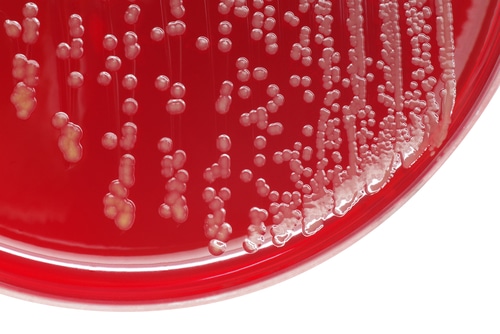Newsletter Signup - Under Article / In Page
"*" indicates required fields
The first vaccine to potentially prevent Staphylococcal-induced toxic shock syndrome (TSS) has successfully completed a phase 2 study. TSS is a life-threatening condition caused by toxins that can lead to multiple organ failure and death.
Nosocomial pathogen methicillin-resistant Staphylococcus aureus (MRSA) bacteria are resistant to widely-used antibiotics. Infections with MRSA are harder to treat and therapies are more expensive as the length of hospital stays is significantly prolonged. If the treatment does not lead to rapid clearance of the bacterial pathogen, dangerous symptoms such as septic or toxic shock can occur – a potentially life-threatening condition.
Researchers at Biomedical Research & Bio-Products AG, under the direction of Martha Eibl, in cooperation with MedUni Vienna’s Department of Clinical Pharmacology in Austria, conducted the phase 2 clinical study. The promising results showed the TSST-1 vaccine is safe and effective, with immunization lasting for at least two years. The results are now subject to a peer review process, with full data to be published in scientific journals. Preparation of a phase 3 study is under way.
Prevention and treatment
“Toxic shock syndrome is a serious and sometimes life-threatening condition and is also caused by MRSA. TSS affects vulnerable groups such as those with compromised immunity through chronic illness, surgery or undergoing dialysis, and is also associated with tampon use in young women. Prevention, early recognition, and treatment of MRSA and TSS are crucial to prevent severe complications and improve outcomes,” said Andreas Roetzer, head of R&D for vaccines at Biomedical Research & Bio-Products AG.
“With highly encouraging data from the phase 2 study building on a successful phase 1, we believe the TSST-1 vaccine could represent a real breakthrough in protecting these groups, as well as medical workers in at-risk settings. We look forward to publication of the full data and to moving TSST-1 into a pivotal phase 3 trial.”
“Developed from a detoxified staphylococcal toxin, the vaccine is administered intramuscularly and its effects are similar to those of a tetanus shot,” said Bernd Jilma of MedUni Vienna’s Department of Clinical Pharmacology.
“After vaccination with TSST-1, individuals develop antibodies that are protective as germs become dangerous. The vaccination is effective irrespective of whether or not strains are resistant to antibiotics. A simple blood test can be used to determine whether someone has low antibody levels, enabling people at risk to be vaccinated preventatively.”
Staphylococci health risk
Most people are affected by antibiotic sensitive or even resistant staphylococci colonization, especially on the skin and mucosa, but presence of the bacteria is generally harmless and goes unnoticed. However, in patients whose immune system is compromised, or who are about to undergo major surgery, staphylococci can lead to serious illness.
Delayed clearance of resistant bacteria can encourage this outcome. TSS can also affect patients undergoing dialysis and organ transplants, as well as those with chronic or liver diseases, and patients after heart surgery. A successful preventative vaccine could also be used to protect medical staff.
Menstrual toxic shock syndrome
TSS is also associated with tampon use in young women, which account for around 50% of all cases. The syndrome was first described in the 1980s, with general symptoms of sepsis or blood poisoning in young girls who had used so-called ‘super tampons.’ This led to regulation of the absorption capacity of tampons. According to a recent study in France, the condition still has an incidence of 1/100,000. According to the Robert-Koch-Institute, the incidence in Germany in 2015 was 3 to 6 cases per 100,000 women of sexually active age. Hospitalization at intensive care units, immediate shock management, and administration of antibiotics are the required forms of treatment.
About the first toxic shock syndrome vaccine
Researchers at Biomedical Research & Bio-Products have identified a class of toxins linked to TSS. They may also play an important role in other diseases caused by staphylococci, such as septic shock.
Detoxified variants of the medically relevant toxins responsible for various forms of toxic shock syndrome are to be combined into a multi-component vaccine. Studies with the multi-component vaccine are already being planned.
Hyperimmune globulins can be used for the treatment of TSS in both preventive (such as prior to major surgeries) and acute (such as for burn patients) cases, similarly to traditional immunization vaccinations for the same target groups.






